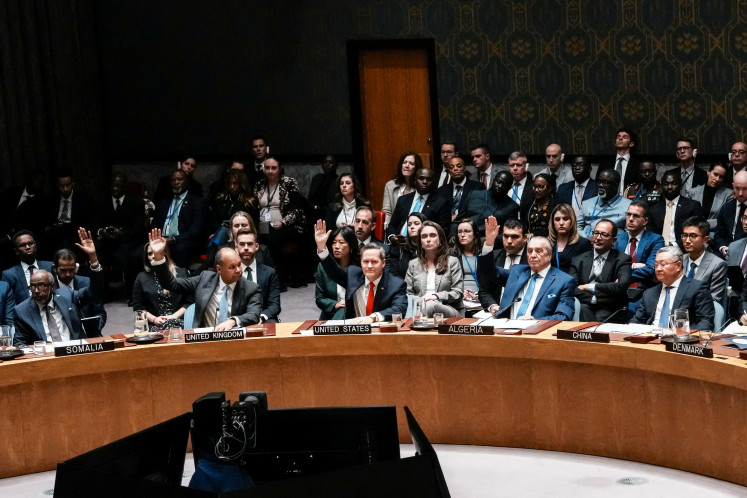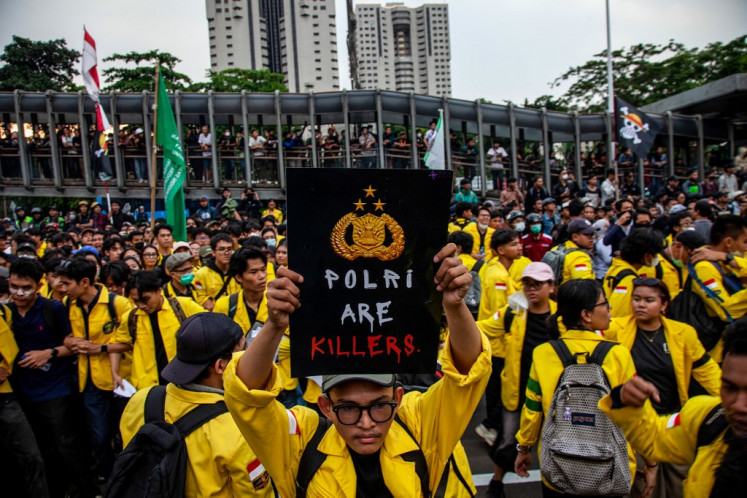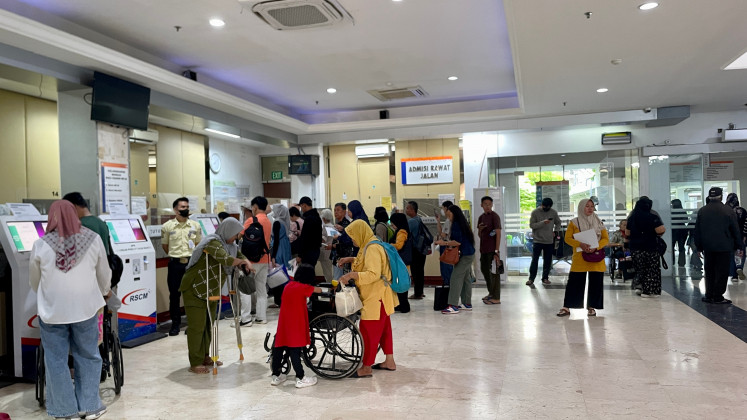Popular Reads
Top Results
Can't find what you're looking for?
View all search resultsPopular Reads
Top Results
Can't find what you're looking for?
View all search resultsFall of the Berlin Wall 30 years on: A day of joy, reflection
The ninth of November is an iconic date for the German people: On this day, 10 years ago, the infamous Berlin Wall was brought down by people’s power, and the way to the reunification of Germany was opened
Change text size
Gift Premium Articles
to Anyone
T
he ninth of November is an iconic date for the German people: On this day, 10 years ago, the infamous Berlin Wall was brought down by people’s power, and the way to the reunification of Germany was opened.
After 40 years of bitter division, Germans on both sides of the Iron Curtain were reunited, and those who had been deprived of freedom and democracy under Communist rule were finally liberated.
It was a day of great and pure joy. We, who saw these events unfolding, will never forget the magic moments, when our fellow countrymen from the Eastern part of Berlin freely and happily crossed the brutal border, which had been closed for so long, and which, over decades, had seen the violent deaths of so many people trying to cross it in vain.
We all witnessed that the will of the people finally prevailed over tyranny, without a shot fired and without a life lost. What we experienced was rightly and justly called a historic miracle and a completely peaceful revolution.
Credit for the peaceful revolution goes, of course, first and foremost to our fellow countrymen in East Germany. It was their thirst for freedom, their courage and tenacity, and also the strictly nonviolent nature of their protests that brought down the Wall.
But credit also goes to our neighbors in Central and Eastern Europe, to the Hungarian, the Polish, the Czech and Slovak peoples, whose ardent desire for freedom had changed the very fabric of what once was a Soviet-dominated bloc of dictatorships.
Had it not been for Lech Walesa and Pope John Paul II, Vaclav Havel and so many other courageous heralds of liberation, we would never have seen the surge of people power in Germany. Their names stand for many who not only felt the “winds of change” blowing but who actually brought about that change.
But without the crucial support of some of the political leaders, we might not have seen the peaceful opening of the Iron Curtain on Nov. 9, 1989. Just two years earlier, in June 1987, then-United States president Ronald Reagan had given his historic speech in Berlin appealing to the Soviet leader: “Mr. Gorbachev, tear down this wall!”
And it was the same Michail Gorbachev who warned the East German regime not to resist the historic paradigm shift — but they would not listen. And former US president George Bush Sr. supported, from early on, the vision of a reunified Germany, anchored in the European Union and the Transatlantic Alliance.
It is true that after the fall of the Iron Curtain, the actual internal unification of Germany proved to be a more difficult task than we had anticipated. While the political, administrative and organizational issues were tackled swiftly and with precision, the economic challenges and especially the psychological hurdles on the way to true internal unity took more time and effort than anyone had believed.
And yes, errors and misjudgment occurred in this giant and complex undertaking. Certainly, we had underestimated, in the wake of revolutionary enthusiasm, the consequences of a fast and disruptive societal and economic paradigm shift for the self-esteem of many people in the East.
Many of those of advanced age, and with established professional careers, found it difficult to adapt to an open but also competitive market economy. Until present day, some of our countrymen from East Germany deplore a certain lack of respect for their — often difficult and arduous — lives in a communist dictatorship.
But however critical some compatriots might see the remaining tasks, it is undisputable Nov. 9, 1989, was one of the happiest, if not the happiest day in the history of the German people, and that the reunification has reconciled Germany after painful decades of division.
Some might be wondering why Nov. 9 has not become our official National Day. Why did we rather choose Oct. 3, the date of our formal reunification in 1990? Nov. 9 not only is the day to remember the downfall of the Iron Curtain.
It was also the day, when in 1938, the barbarous Nazis regime staged its first large-scale murderous pogroms against the Jewish population in Germany, with hundreds of German Jews murdered, tens of thousands thrown into concentration camps, thousands of Jewish shops plundered and Synagogues burned down.
The pogroms were part of a heinous strategy of mass murder, which led directly to the horrors of the Holocaust, with 6 million Jews murdered. Thus, Nov. 9 is also a day when we remember the unfathomable evil of the Holocaust and antisemitism.
For us Germans, Nov. 9 is thus a day of far-reaching historical and moral significance, a date that teaches us important lessons. It reminds us that with the joy over freedom and unity comes the responsibility to be aware and to never forget. This day reminds us of our German political imperative to always stand up for the dignity and freedom of human beings, wherever they are threatened or persecuted, and to fight intolerance, chauvinism, xenophobia, antisemitism and all other forms of ethnic or religious discrimination.
But the historic miracle of 1989 also teaches us a lesson of optimism and humility: The history of humankind does not obey rules and laws erected by ideologues.
However firm a dictatorship may seem to stand and however steadfast their rule may appear, freedom and human rights cannot be suppressed and neglected forever, and historic change can come when and where it is least expected.
After all, it is human beings that make history, not abstract theories. Remembering tyranny overcome, we stand united in celebrating the liberation and in our readiness to defend the achievements of the peaceful revolution, freedom, true democracy and the rule of law.
















